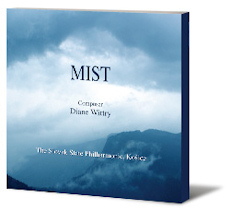
The Internet's Premier Classical Music Source
Related Links
- Wittry Reviews
- Latest Reviews
- More Reviews
-
By Composer
-
Collections
DVD & Blu-ray
Books
Concert Reviews
Articles/Interviews
Software
Audio
Search Amazon
Recommended Links
Site News
 CD Review
CD Review
Diane Wittry

Mist
Slovak State Philharmonic, Košice/Diane Wittry
Spoken introduction by Wittry: 4:48; Mist 16:30
Music Rental: Theodore Presser Company
Piźazz Music availability: www.dianewittry.com $6 + S&H
This exciting – and beautiful – new tone poem, written on the Island of Elba in the Mediterranean, where Napoleon was exiled, is meant to evoke a sense of early morning by the sea, which typically is misty there. The piece could be called impressionistic but it is not at all like Debussy's La Mer, or Sibelius' Oceanides. Harmonically, it is "centered around diminished chords" and the tritone, Wittry says. There is some aleatoric disruption of timing by the strings. A trumpet is used as "an antagonist," its "haunting cry" meant to be "a reminder of things unsettled." The orchestration includes unusual instruments and effects: large and small "rain sticks," which are hollow and pierced bamboo pieces, water pans with actual falling water, and flutes and trumpets without sounded notes but with the sound of air blown through them, as well as wind chimes. There is a full complement of woodwinds and brass, harp, timpani, glockenspiel and suspended cymbal, in addition to strings.
All of this may suggest a work more strange-sounding than it is; the special effects blend well into the whole context. The work begins with very low and very high tones, giving a growly fog-horn effect. It growls later also. There are sustained chords, a drum roll, some trills, some swelling legato melody and some tinkly and shimmering sounds. Before the midpoint a persistent eight note melodic figure becomes noticeable. It undulates, becomes mysterious, yields to shorter melodic figures. A scary moment yields to a quiet bassoon and then a flute.
Dynamics are wide-ranging, sometimes louder than one might associate with mist. Turning the recorded volume lower than the level of the spoken introduction may preserve the illusion of a quiet morning.
I became aware of the existence of this piece after helping as a volunteer usher very recently for a young person's concert by the Milwaukee Symphony. The concert had a Halloween theme; the audience was a full house of exceptionally well-behaved elementary school children, and the conductor was Diane Wittry, of whom I had never heard and who received no local publicity. Ms. Wittry was not only a very good conductor but was superb with children. Before playing Grieg's Hall of the Mountain King she explained the context of the selection within the play and confessed that she needed a chorus, didn't have one, and asked who would like to be part of one. The response was enthusiastic. As it happened no singing was needed, just the rapid, repeat of a short phrase, in English, "Catch him." After the briefest conceivable rehearsal, just the request, "faster," and the prompt of a big flash card from the stage, hundreds of young voices were added to the orchestral sound in perfect unison timing. Their achievement won high praise from the podium. After this I had to know who Wittry was, so I located her website, and found that she is Music Director of the Allentown Symphony and the Norwalk Symphony. This recording was listed, and I decided to send for it. If you listen to it too I am convinced you will not regret it.
Copyright © 2009 by R. James Tobin












